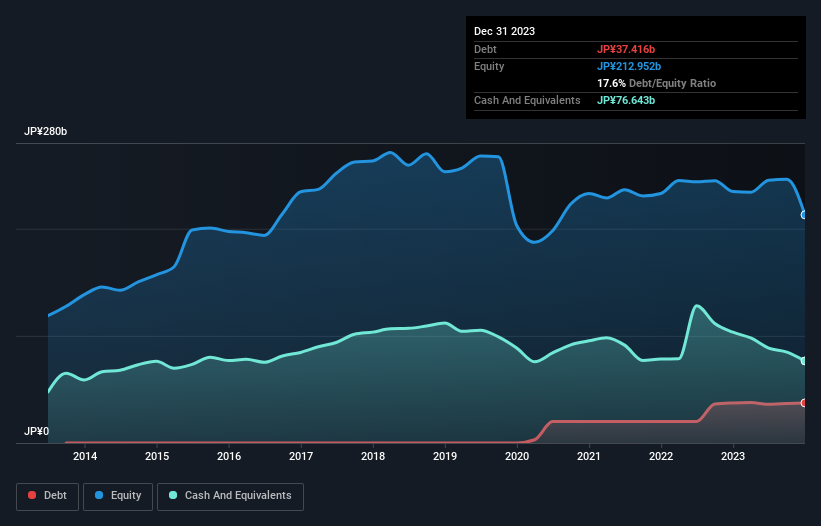The external fund manager backed by Berkshire Hathaway's Charlie Munger, Li Lu, makes no bones about it when he says 'The biggest investment risk is not the volatility of prices, but whether you will suffer a permanent loss of capital.' So it might be obvious that you need to consider debt, when you think about how risky any given stock is, because too much debt can sink a company. We note that DeNA Co., Ltd. (TSE:2432) does have debt on its balance sheet. But should shareholders be worried about its use of debt?
What Risk Does Debt Bring?
Generally speaking, debt only becomes a real problem when a company can't easily pay it off, either by raising capital or with its own cash flow. If things get really bad, the lenders can take control of the business. However, a more frequent (but still costly) occurrence is where a company must issue shares at bargain-basement prices, permanently diluting shareholders, just to shore up its balance sheet. Of course, debt can be an important tool in businesses, particularly capital heavy businesses. When we think about a company's use of debt, we first look at cash and debt together.
See our latest analysis for DeNA
How Much Debt Does DeNA Carry?
The chart below, which you can click on for greater detail, shows that DeNA had JP¥37.4b in debt in December 2023; about the same as the year before. However, it does have JP¥76.6b in cash offsetting this, leading to net cash of JP¥39.2b.

How Healthy Is DeNA's Balance Sheet?
Zooming in on the latest balance sheet data, we can see that DeNA had liabilities of JP¥34.2b due within 12 months and liabilities of JP¥69.8b due beyond that. Offsetting this, it had JP¥76.6b in cash and JP¥26.6b in receivables that were due within 12 months. So its total liabilities are just about perfectly matched by its shorter-term, liquid assets.
Having regard to DeNA's size, it seems that its liquid assets are well balanced with its total liabilities. So while it's hard to imagine that the JP¥177.8b company is struggling for cash, we still think it's worth monitoring its balance sheet. Despite its noteworthy liabilities, DeNA boasts net cash, so it's fair to say it does not have a heavy debt load! The balance sheet is clearly the area to focus on when you are analysing debt. But ultimately the future profitability of the business will decide if DeNA can strengthen its balance sheet over time. So if you're focused on the future you can check out this free report showing analyst profit forecasts.
Over 12 months, DeNA reported revenue of JP¥138b, which is a gain of 3.4%, although it did not report any earnings before interest and tax. That rate of growth is a bit slow for our taste, but it takes all types to make a world.
So How Risky Is DeNA?
We have no doubt that loss making companies are, in general, riskier than profitable ones. And in the last year DeNA had an earnings before interest and tax (EBIT) loss, truth be told. And over the same period it saw negative free cash outflow of JP¥19b and booked a JP¥30b accounting loss. Given it only has net cash of JP¥39.2b, the company may need to raise more capital if it doesn't reach break-even soon. Overall, we'd say the stock is a bit risky, and we're usually very cautious until we see positive free cash flow. There's no doubt that we learn most about debt from the balance sheet. However, not all investment risk resides within the balance sheet - far from it. We've identified 1 warning sign with DeNA , and understanding them should be part of your investment process.
At the end of the day, it's often better to focus on companies that are free from net debt. You can access our special list of such companies (all with a track record of profit growth). It's free.
New: Manage All Your Stock Portfolios in One Place
We've created the ultimate portfolio companion for stock investors, and it's free.
• Connect an unlimited number of Portfolios and see your total in one currency
• Be alerted to new Warning Signs or Risks via email or mobile
• Track the Fair Value of your stocks
Have feedback on this article? Concerned about the content? Get in touch with us directly. Alternatively, email editorial-team (at) simplywallst.com.
This article by Simply Wall St is general in nature. We provide commentary based on historical data and analyst forecasts only using an unbiased methodology and our articles are not intended to be financial advice. It does not constitute a recommendation to buy or sell any stock, and does not take account of your objectives, or your financial situation. We aim to bring you long-term focused analysis driven by fundamental data. Note that our analysis may not factor in the latest price-sensitive company announcements or qualitative material. Simply Wall St has no position in any stocks mentioned.
About TSE:2432
Excellent balance sheet and fair value.
Similar Companies
Market Insights
Community Narratives



